Calendar
The Life of Saint Luke
31. October 2016 - 11:31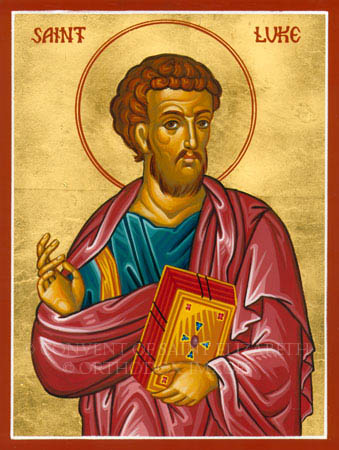 Saint Luke was born a Greek and a Gentile in Antioch, Syria. He was a physician and it is believed that he may have also been a slave, as it was not uncommon in his day for slaves to be educated in medicine so the family would have a resident physician.
Saint Luke was born a Greek and a Gentile in Antioch, Syria. He was a physician and it is believed that he may have also been a slave, as it was not uncommon in his day for slaves to be educated in medicine so the family would have a resident physician.
Luke became a close companion of Paul of Tarsus and accompanied him on his missionary journeys. It is very possible that Luke provided medical assistance to Paul when he had been beaten, stoned or nearly drowned while evangelizing to the Western Roman Empire.
Luke is the only Gentile to have written books in the Bible. He is the writer of the third Gospel and the Acts of the Apostles and his writings have been proven to be historically accurate.
The Universal Exaltation of the Precious and Life-Giving Cross
26. September 2016 - 15:00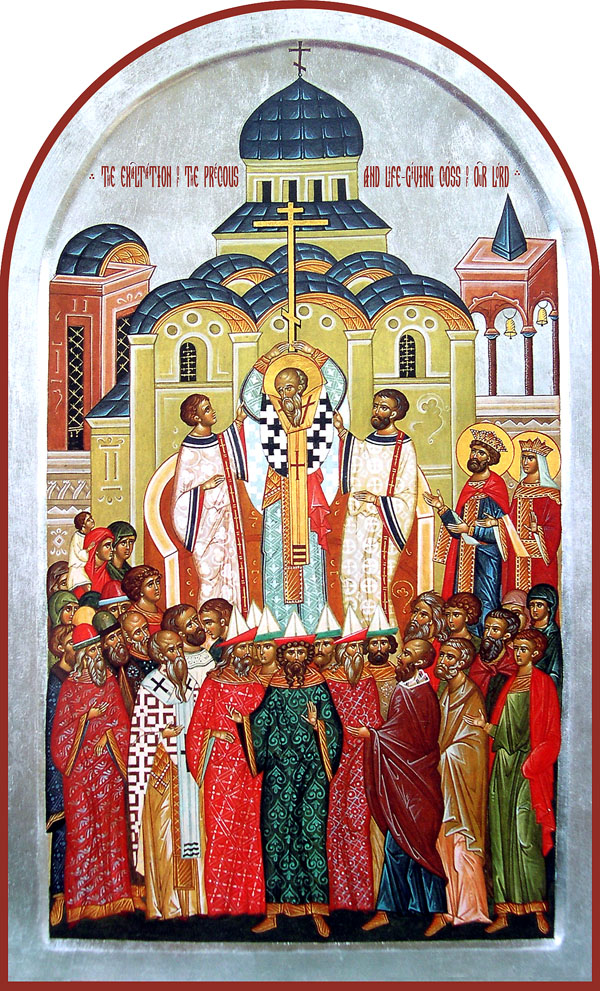 The Elevation of the Venerable and Life-Creating Cross of the Lord: The pagan Roman emperors tried to completely eradicate from human memory the holy places where our Lord Jesus Christ suffered and was resurrected for mankind. The Emperor Hadrian (117-138) gave orders to cover over the ground of Golgotha and the Sepulchre of the Lord, and to build a temple of the pagan goddess Venus and a statue of Jupiter.
The Elevation of the Venerable and Life-Creating Cross of the Lord: The pagan Roman emperors tried to completely eradicate from human memory the holy places where our Lord Jesus Christ suffered and was resurrected for mankind. The Emperor Hadrian (117-138) gave orders to cover over the ground of Golgotha and the Sepulchre of the Lord, and to build a temple of the pagan goddess Venus and a statue of Jupiter.
Pagans gathered at this place and offered sacrifice to idols there. Eventually after 300 years, by Divine Providence, the great Christian sacred remains, the Sepulchre of the Lord and the Life-Creating Cross were again discovered and opened for veneration. This took place under the Emperor Constantine the Great (306-337) after his victory in the year 312 over Maxentius, ruler of the Western part of the Roman empire, and over Licinius, ruler of its Eastern part. In the year 323 Constantine became the sole ruler of the vast Roman Empire.
The Dormition of the Most-holy Theotokos
27. August 2016 - 22:17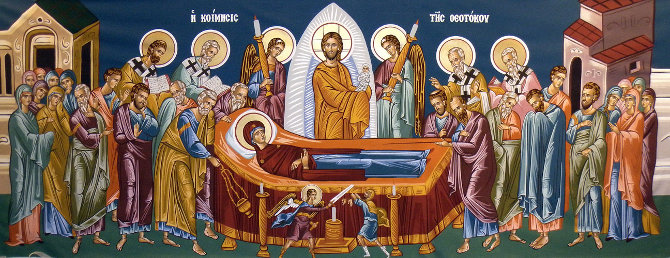 The Lord Who, on Mount Sinai, gave the Fifth Commandment, Honor thy father and thy mother, showed by His own example how one should respect one’s parents.
The Lord Who, on Mount Sinai, gave the Fifth Commandment, Honor thy father and thy mother, showed by His own example how one should respect one’s parents.
Hanging on the Cross in agony, He remembered His Mother, and indicating the Apostle John He said to her: Woman, behold thy son. After that, He said to John: Behold thy mother. And so, providing for His Mother, He breathed His last. John had a home on Mount Zion, in Jerusalem, in which the Theotokos then lived. She dwelt there to the end of her days on earth. By her prayers, kind guidance, meekness and patience, she greatly assisted her Son’s apostles. She spent most of her remaining time on earth in Jerusalem, often visiting those places that reminded her of the great events and of the great works of her Son. She especially visited Golgotha, Bethlehem, and the Mount of Olives. Of her few distant journeys, her visit to St. Ignatius the God-bearer in Antioch is recorded; as is her visit to Lazarus (whom our Lord resurrected on the fourth day), the Bishop of Cyprus. She also visited Mount Athos, which she blessed; and she stayed in Ephesus with St. John the Evangelist during the time of the great persecution of Christians in Jerusalem.
The Nativity of Saint John the Baptist
7. July 2016 - 8:29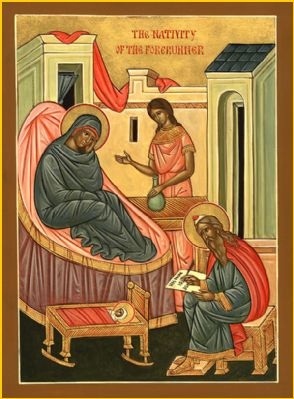 Among the Church's feasts, there are three in honor of God's saint which in their significance stand out from the others devoted to the saints and are numbered among the great feasts of the Church of Christ. These feasts glorify the economy of God for our salvation.
Among the Church's feasts, there are three in honor of God's saint which in their significance stand out from the others devoted to the saints and are numbered among the great feasts of the Church of Christ. These feasts glorify the economy of God for our salvation.
These three feasts are the Nativity of St. John the Forerunner, his Beheading, and the feast of the Holy Apostles Peter and Paul.
The apparition of the holy Archangel Gabriel to the priest Zacharias in the Temple, with the announcement of the birth to him and the righteous Elizabeth, of a son who would prepare the way for the Lord, the Savior of the world, and the subsequent fulfillment of this premise, are the first of the events related by the Evangelists.
Pentecost: The Descent of the Holy Spirit
19. June 2016 - 9:03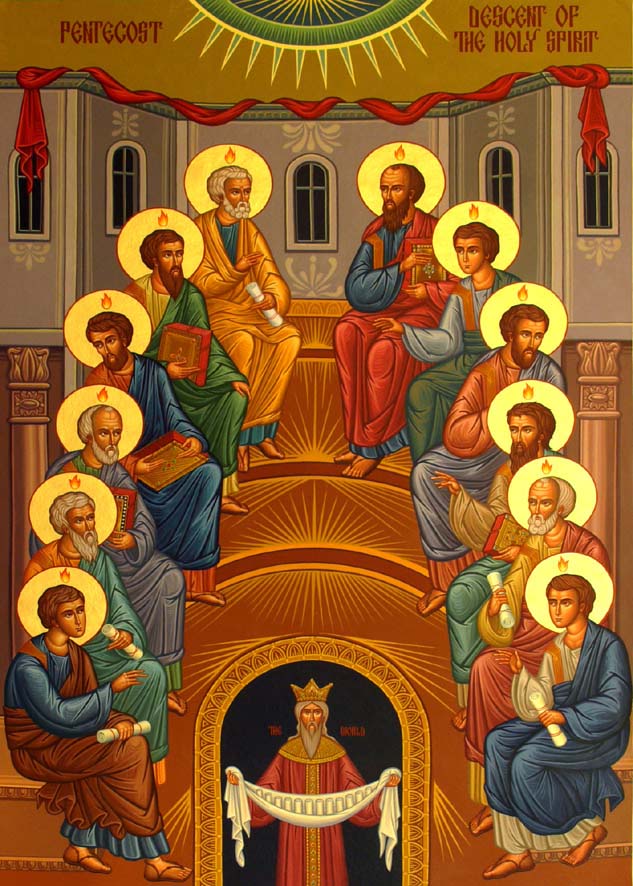 In the Old Testament, Pentecost was the feast that occurred fifty days after Passover. As the Passover feast celebrated the exodus of the Israelites from the slavery of Egypt, so Pentecost celebrated God's gift of the ten commandments to Moses on Mount Sinai.
In the Old Testament, Pentecost was the feast that occurred fifty days after Passover. As the Passover feast celebrated the exodus of the Israelites from the slavery of Egypt, so Pentecost celebrated God's gift of the ten commandments to Moses on Mount Sinai.
In the new covenant of the Messiah, the Passover event takes on its new meaning as the celebration of Christ's death and resurrection, the "exodus" of men from this sinful world to the Kingdom of God. And in the New Testament as well, the Pentecostal feast is fulfilled and made new by the coming of the "new law," the descent of the Holy Spirit upon the disciples of Christ.
When the day of Pentecost had come, they were all together in one place. And suddenly a sound came from heaven like the rush of a mighty wind, and it filled all the house where they were sitting. And there appeared to them tongues as of fire, distributed as resting upon each one of them. And they were all filled with the Holy Spirit ... (Acts 2:1–4).
The Holy Spirit that Christ had promised to his disciples came on the day of Pentecost (cf. Jn 14:26, 15:26; Lk 24:49; Acts 1:5). The apostles received "the power from on high," and they began to preach and bear witness to Jesus as the risen Christ, the King and the Lord. This moment has traditionally been called the birthday of the Church.
The Ascension of the Lord
8. June 2016 - 15:02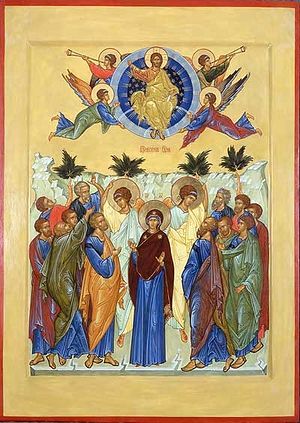 When the day of the Jewish Pentecost drew near, the disciples of Christ returned from Galilee to Jerusalem.
When the day of the Jewish Pentecost drew near, the disciples of Christ returned from Galilee to Jerusalem.
On the fortieth day after the resurrection of Jesus Christ, they were all together in one house. Jesus Christ appeared to them and spoke with them saying, "Thus it is written that the Christ should suffer and on the third day rise from the dead, and that repentance and forgiveness of sins should be preached in His name to all nations beginning from Jerusalem. You are witnesses of these things. Go into all the world and preach the Gospel to all creation. He, who believes and is baptized, will be saved, but he, who does not believe, will be condemned. And these signs accompanies those who believe: in My name they will cast out demons; they will speak in new tongues; they will pick up serpents, and if they drink any deadly thing, it will not hurt them; they will lay their hands on the sick, and they will recover."

